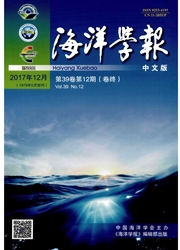

 中文摘要:
中文摘要:
分割海底声纳探测图像,提取单元特征向量进行主成份分析,选取均值、标准差、对比度、相关系数、能量及同质性作为训练特征向量,构建小波神经网络。利用遗传算法优化小波神经网络的初始权值及小波参数,对砂、礁石、泥3种底质类型分别进行训练,并得到3种底质的测试精度都在90%以上,优于单独利用小波神经网络进行训练时的测试精度,克服了小波神经网络训练时易陷入局部极小的固有缺陷,表明基于遗传算法的小波神经网络可有效用于海底底质声纳图像的识别和分类。
 英文摘要:
英文摘要:
Segmenting the seafloor sonar gray image,and extracting characteristic vector unit with principal component analysis, the selection of the mean, standard deviation, contrast, correlation coefficient, energy and homogeneity is as training characteristic vector, to build wavelet neural network. Using genetic algorithm to optimize the wavelet neural network initial weights and wavelet parameters, the three of sediment types sand, rocks, mud were been training,and get three sediment test accuracy of 90 ~ or more, far better than single wavelet neural network train- ing test accuracy. Experiments show that wavelet neural network based on genetic algorithm can be effectively used for seabed sediment sonar image recognition and classification, and overcome that the wavelet neural network train- ing shortcomings easy to fall into local minimum.
 同期刊论文项目
同期刊论文项目
 同项目期刊论文
同项目期刊论文
 期刊信息
期刊信息
